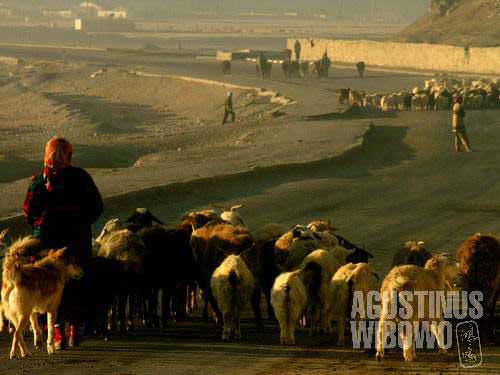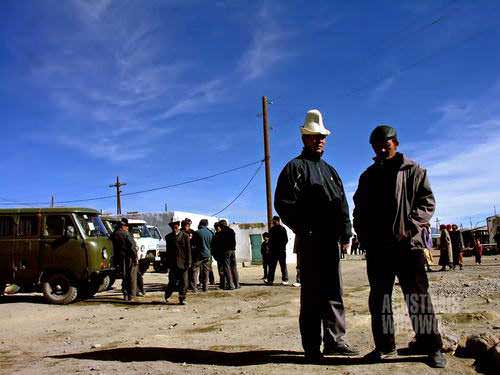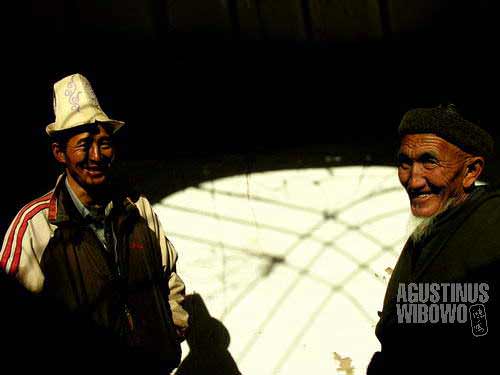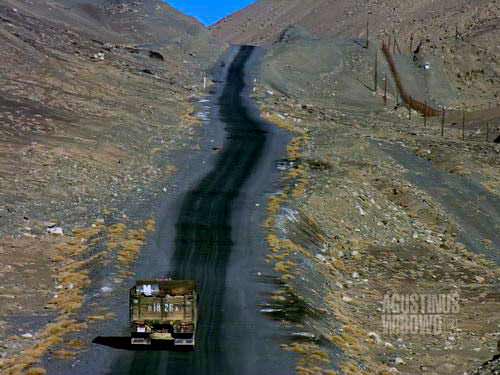Karakul – Out of Murghab

A new day, and a new month, starts in Murghab
The new month has just started, and I have only 4 days left on my visa. I met these two guys in the bazaar of Murghab, one with visa expiring today (November 1). The guys were from America and Israel, and they have been waiting for onward travel to Kyrgyzstan. They were there in the bazaar yesterday but failed to depart. Today is the second day (and supposed to be the last day) attempt.
Murghab is somehow a depressing place to wait for transport. As now the oil price has skyrocketed, one’s a month salary is only enough to cover the distance from Murghab to Osh or to Khorog in a public transport for one time. People don’t travel anywhere. There are many drivers but not passengers. The drivers hang around the bazaar the whole day to get passengers, and except the two travelers, and me, there is nobody else to share the cost. Some drivers even didn’t have petrol for their vehicles. The cost is always calculated in terms of liters of oil, with 3.40 Somoni/liter standard in Murghab. In Langar I even saw a driver asked the passengers to supply the oil rather than paying cash. Oil price has affected much of life here.
The drivers were frustrated and aggressive. The Kyrgyz ethnic drivers quoted 200 $ for taking the two travelers to Osh in South Kyrgyzstan. The normal price for a full passenger bus is 70 Somoni (20$) per person. But the problem is, there are so many cars but no passengers at all. The drivers insisted about the price and refused any kinds of negotiation.

The sleepy bazaar and hungry drivers
Second by second passes. Murghab seemed too lazy to follow the world’s movement. The bazaar was still deserted. The two tourists were as frustrated as the world is watching the sleazy Murghab. The Israeli guy started to curse anything wrong here. “What a stupid NGO here doing nothing but extorting money from tourists!”
He was talking about the French NGO, Acted, working for development of Pamir region. For tourists the NGO is known to offer home stay programs, car rents, and souvenir shops. “But the NGO doesn’t work only on tourism. They have offered micro credit to locals,” I protested him.
“If they give me chance, I know fucking millions of ideas to make this fucking place fucking more better,” cursed the Israeli.
“For example?”
“Providing the foreigners as English teacher volunteers!”
Changing the Kyrgyz community of Murghab to speak English? They even still don’t speak their own national language yet!
“But then, Acted has provided the unemployed here with computer training, so that they will have some skills to earn money,” said I.
“But what the use of computer skill?” he protested.
“What the use of speaking English?”
The American guy, despite of his worry of the expiring visa, was more calm than the Israeli. He said that micro credit worked often in many areas, as for his experience in Latin America countries, to support local economy. For the case of Murghab, though, as the economy was really paralyzed, he was also pessimistic.
“This place, is …, simply, …,” the Israeli tries to describe Murghab, “lazy…. Yes, that’s the word. And look at those people with those stupid hats”
He was talking about the Kyrgyz with their white kalpak hats. For me, kalpak is simply beautiful instead of stupid.

The Kyrgyz men in Murghab bazaar, with the hat they are proud of.
The discussion stopped as we were all frustrated. Time almost turned to midday but we still haven’t got any transport yet. The drivers started to be frustrated also, and started to negotiate the price with the tourists. At last, the Kyrgyz driver who initially quoted 300$ for his jeep, agreed the two guys to pay 140$, saying that he needed to go to Osh anyway with his parents. I joined the tourists and asked to be dropped off in Karakul, the lake near the Kyrgyz border.
It was not until 2 hours later that we really left Murghab. First we had to pick the driver’s father from the bazaar, waited for him to finish shopping. Then we picked the mother somewhere else. Then another two aunties in nearby village. And at last we kicked on the Pamir Highway. Suddenly the car turned right, left the highway and ran on the bumpy road westward. We arrived in a village in the middle of nowhere, Rang Kul. The giant snow capped mountain in Chinese Xinjiang territory, the Muztagh Ata, is visible from here. This village is so isolated, just like the end of the world, the end of the isolated Tajikistan where you can disappear to world of nowhere. And here the drivers picked up two more aunties to his jeep before heading back the 40 km distance to the Pamir Highway.
The small jeep was completely packed with the driver’s aunties.
And the two tourists paid 140$ for their two tiny seats.

Can that be China behind the fences?
The road along Pamir Highway after Murghab stretched parallel with the Chinese border. Just 20 m at the right side of the road, there were wire fences along the road, seemed like separating this country from another, a giant, one. The Lonely Planet simply stated that the fences were the Chinese border. “I saw nothing there,” I didn’t believe that it was China at the other side of the fences.
“It is actually here which has nothing. That side is actually a superpower!” said the Israeli guy who soon was going to China. The two travelers then discussed about the Israel border fences which was equipped by sensor and electric shocks to punish the illegal Palestinian border crossers.
But actually that is not China behind the fences. If you see on the map, China is still 15 km away from here. The fences limited the rest of Tajikistan from the sensitive Chinese border zone. A military guy told me it was a neutral zone behind the fences. But I read some resources that China was still trying to claim 20% of GBAO area, along the border zone, which also contain gold deposit. I wonder whether it is the area the books talking about.
We arrived at night at Karakul, after the tedious custom checks along the road. I couldn’t stand anymore sitting, at the back of a fully packed jeep (just couldn’t believe they paid 140 dollars for this!). The car continued their way up north to Kyrgyzstan.
I stayed here in Karakul, a small village next to a giant, black, death lake.

Leave a comment